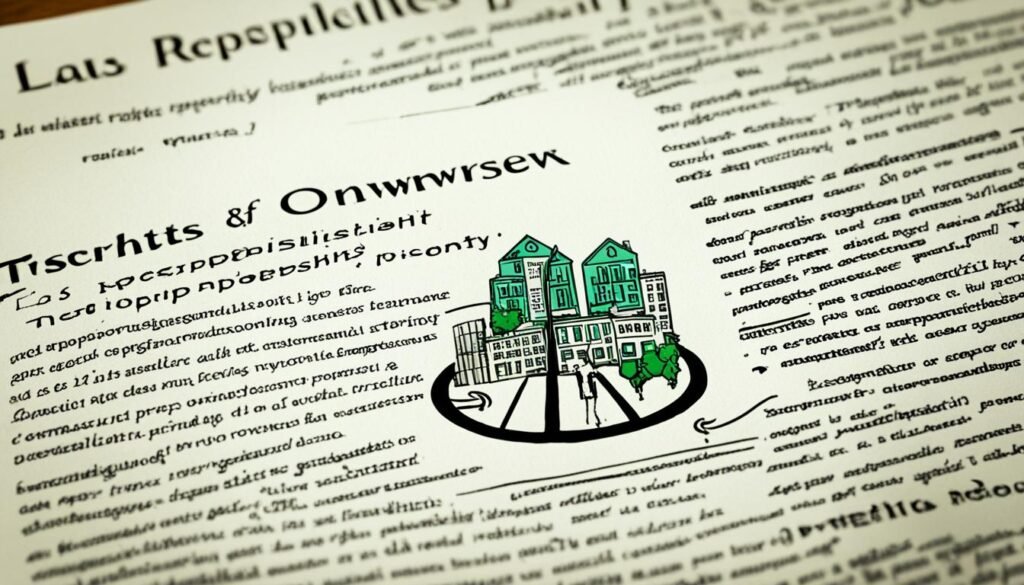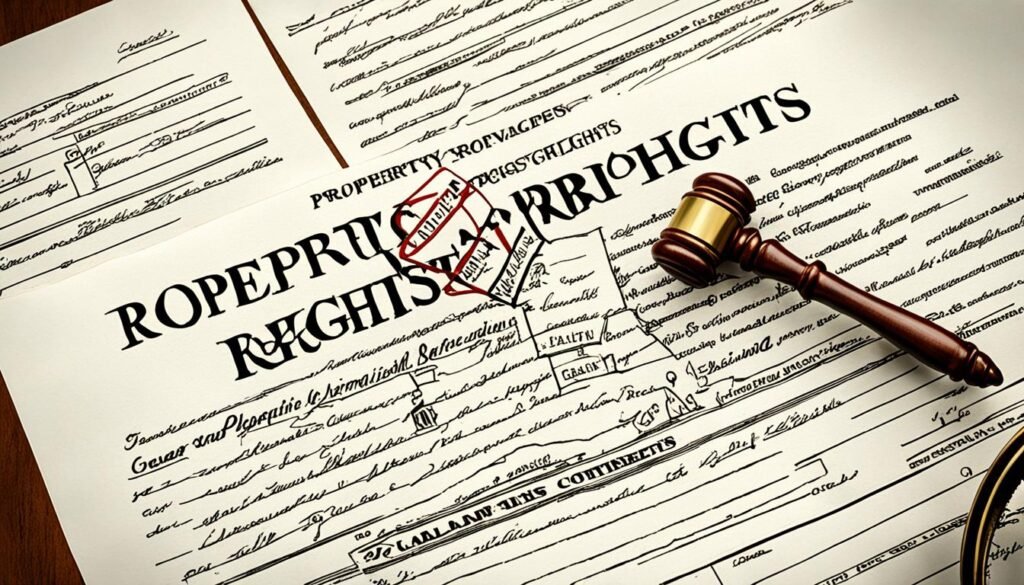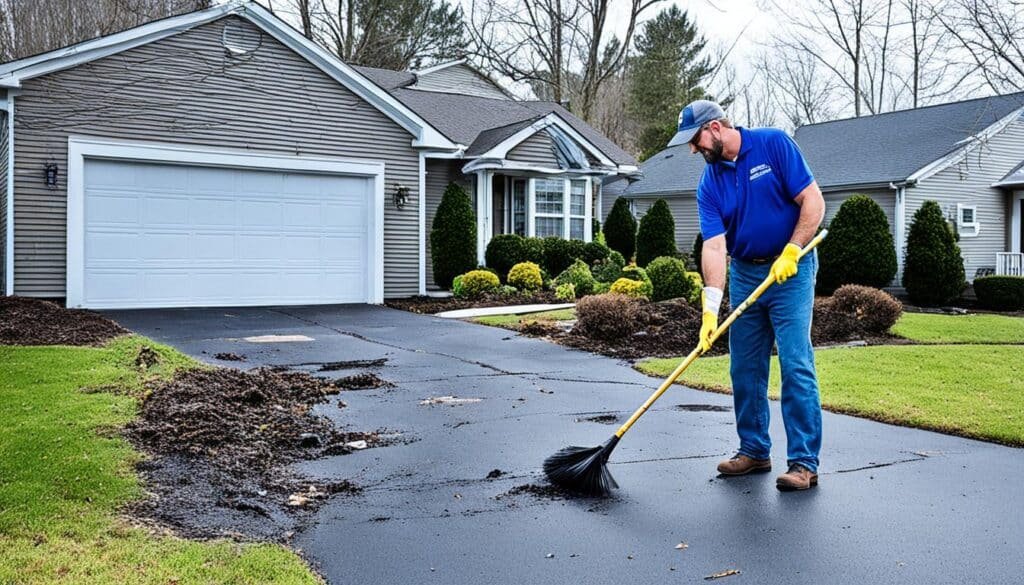In the United States, property law governs the rights and responsibilities associated with owning and using various forms of property. This includes real estate (land and permanent improvements), tangible personal property (physical and movable possessions), intangible property (valuable assets that cannot be seen or touched), and intellectual property (creative ideas and inventions).
Also Read: International Perspectives On Criminal Law
Property law is a complex and multifaceted area of the law, encompassing a wide range of legal issues related to the ownership, use, and transfer of both real property and personal property. It is primarily governed by state laws, although there are also relevant federal laws and regulations that may come into play. Understanding the principles of property law is essential for property owners, tenants, real estate professionals, and anyone else involved in property-related transactions or disputes.
Key Takeaways
- Property law governs the rights and responsibilities associated with owning and using various forms of property in the United States.
- The main types of property include real estate, tangible personal property, intangible property, and intellectual property.
- Ownership and possession are distinct concepts in property law, with ownership granting a bundle of legal rights.
- The U.S. Constitution provides protections for property rights through the Fifth and Fourteenth Amendments.
- Property owners have a range of legal rights, including the right to possession, use, transfer, exclude, and destroy their property.
Types of Property
In the realm of property law, there are several distinct categories that hold unique legal considerations. These include real property, tangible personal property, intangible property, and intellectual property.
Also Read: What Role Does Justice Play In Justifying Law?
Real Property
Real property refers to land and any permanent improvements attached to it, such as buildings, fixtures, and structures. This type of property is often considered the most valuable and is subject to extensive legal regulations governing ownership, use, and transfer.
Tangible Personal Property
Tangible personal property encompasses physical and movable possessions, including furniture, electronics, vehicles, artwork, and other goods. These items can be owned, used, and transferred like real property, but they are generally less permanent and more easily transported.
Intangible Property
Intangible property consists of valuable assets that cannot be physically touched or seen, such as stocks, bonds, franchises, and intellectual property rights. These assets still hold significant legal value and are subject to various laws and regulations governing their ownership, use, and transfer.
Intellectual Property
Intellectual property refers to creative ideas, inventions, and expressions that are legally protected, including patents, trademarks, copyrights, trade secrets, characters, logos, music, and slogans. These intangible assets are granted exclusive rights and legal protections under specialized intellectual property laws.
Ownership vs. Possession

In the realm of property law, the concepts of ownership and possession are distinct yet intertwined. Ownership is a legal construct that grants individuals a bundle of rights over a particular property, including the rights to use, control, and transfer that property. On the other hand, possession refers to the actual control and intention to exercise that control over a property, regardless of legal ownership.
Also Read: How Are Contracts Enforced In Contract Law?
The legal owner of a property may not always be the person in possession of it. For example, a landlord owns a rental property, but the renter possesses it and exercises control over its use. Similarly, a person may possess a property without being the legal owner, such as in the case of a tenant or a caretaker.
The distinction between ownership and possession can have significant legal implications, particularly in matters of liability, taxation, and dispute resolution. Understanding the nuances of these concepts is crucial for property owners, renters, and other stakeholders in the world of real estate and personal property.
| Ownership | Possession |
|---|---|
| Legal rights and title to a property | Physical control and use of a property |
| Grants a bundle of rights, including the right to use, control, and transfer | Refers to the actual control and intention to exercise that control |
| The legal owner may not always be the person in possession | A person may possess a property without being the legal owner |
| Implications for liability, taxation, and dispute resolution | Implications for liability, taxation, and dispute resolution |
The distinction between ownership and possession is a fundamental concept in property law, with far-reaching implications for property owners, renters, and other stakeholders. Understanding these nuances is crucial for navigating the complex world of real estate and personal property transactions.
Constitutional Protection of Property Rights

The U.S. Constitution provides robust constitutional protection for property rights through the Fifth Amendment and Fourteenth Amendment. These foundational legal frameworks safeguard individuals’ fundamental rights to own, use, and transfer their property without undue government interference.
Also Read: DSST Exams: Are You Prepared To Ace Them?
Fifth Amendment
The Fifth Amendment to the U.S. Constitution states that the government cannot deprive any person of “life, liberty, or property, without due process of law.” This clause ensures that the government cannot seize or restrict an individual’s property rights without following proper legal procedures and providing just compensation.
Fourteenth Amendment
The Fourteenth Amendment further strengthens the constitutional protection of property rights by extending the due process and equal protection guarantees to state and local governments. This prevents state and local authorities from arbitrarily infringing on an individual’s property rights without adhering to the rule of law.
Together, the Fifth and Fourteenth Amendments form a robust legal framework that safeguards property rights from undue government eminent domain actions or other unconstitutional interference. This ensures that property owners are afforded the full due process and just compensation protections enshrined in the U.S. Constitution.
Rights of Property Owners

Property ownership grants individuals a bundle of legal rights, including the right to possession, use, transfer, exclude, and even destroy the property they own. These rights are considered the core principles of property law and are essential for understanding the concept of private property in the United States.
Also Read: CTC Exams Prep: Your Pathway To Teaching Certification
Right to Possession
The right to possession gives property owners the authority to control and occupy their property. This means they can live on, work on, or otherwise utilize the land, buildings, or other tangible assets they own. The right to possession also allows owners to exclude others from accessing or using their property without permission.
Right to Use
In addition to the right of possession, property owners have the lawful right to use their property as they see fit, as long as their use does not infringe on the rights of others or violate any applicable laws or regulations. This includes the ability to rent, sell, gift, or bequeath the property they own.
Right to Transfer
The right to transfer property ownership is a fundamental aspect of property law. Owners can sell, donate, or leave their property to others through wills or other legal means. This ensures the continuity of property rights and allows for the efficient transfer of assets between individuals or across generations.
Right to Exclude
The right to exclude gives property owners the ability to prevent others from entering or using their property without permission. This protects against trespassing and helps maintain the owner’s exclusive control over their land, buildings, or other assets.
Right to Destroy
In some cases, property owners may have the right to destroy or demolish their own property, subject to any applicable zoning laws, building codes, or other legal restrictions. This right allows owners to make changes or improvements to their property as they see fit, though it does not extend to the destruction of property that belongs to others or that has historical or cultural significance.
Property Law

Property law encompasses several legal instruments and agreements that can grant specific rights or impose restrictions on the use of property. These include property titles and deeds, easements, restrictive covenants, and rental lease agreements.
Property Titles and Deeds
A property title is a legal document that establishes ownership of real property, such as land and buildings. The deed is the written instrument that conveys the title from the seller to the buyer, formally transferring ownership and legal rights to the new property owner. Titles and deeds are crucial to documenting the transfer of ownership and ensuring the lawful use of the property.
Easements
An easement is a legal right granted by a property owner that allows someone else to use a portion of the land for a specific purpose, such as access or utilities. Easements can be permanent or temporary and can affect the land use and community rules governing the property. They are important to understand when purchasing or owning property.
Restrictive Covenants
Restrictive covenants are contractual agreements that place limitations or restrictions on the use of property. These covenants are typically imposed by a developer or homeowners’ association and are legally binding on current and future property owners. They can regulate aspects like building design, landscaping, and even behavioral standards within a community.
Rental Lease Agreements
Landlords and tenants enter into rental lease agreements, which are legal documents that outline the terms and conditions of the rental relationship. These contracts specify the rights and responsibilities of both parties, including the duration of the lease, monthly rent, security deposits, and any restrictions on the use of the property.
| Legal Instrument | Purpose | Key Considerations |
|---|---|---|
| Property Titles and Deeds | Establish legal ownership and transfer of real property | Ensure lawful use and document changes in ownership |
| Easements | Grant limited rights to use a portion of someone else’s property | Affect land use and community rules |
| Restrictive Covenants | Impose limitations on the use of property within a community | Legally binding on current and future property owners |
| Rental Lease Agreements | Outline the terms and conditions of a landlord–tenant relationship | Specify rights, responsibilities, and restrictions on the use of property |
Intellectual Property Rights

Distinct from other forms of property, intellectual property (IP) is protected by specialized legal frameworks that grant exclusive rights to inventors, creators, and brand owners. These legal protections for intellectual property rights (IPR) incentivize innovation, promote creativity, and safeguard the commercial value of inventions, creative works, and distinctive brand identities.
Trademarks
Trademarks are distinctive words, symbols, designs, or combinations thereof that identify and distinguish the source of goods or services. Trademark registration provides the owner with exclusive rights to use the mark in commerce and prevent others from using confusingly similar marks. This allows businesses to build brand equity and prevent consumer confusion in the marketplace.
Patents
Patents grant inventors the exclusive right to make, use, and sell their inventions for a limited period, typically 20 years. This provides an incentive for individuals and companies to invest in research and development, knowing they can recoup their investment and profit from their creative efforts. Patents cover a wide range of innovations, including machines, processes, compositions of matter, and designs.
Copyrights
Copyrights protect original creative works, such as literary works, musical compositions, paintings, sculptures, films, and computer software. Copyright holders have the exclusive right to reproduce, distribute, display, perform, and create derivative versions of their works. Copyrights last for the lifetime of the creator plus an additional 70 years, ensuring the protection of creative works for an extended period.
Future Trends in Property Law

As the digital revolution continues to transform every aspect of society, property law is facing significant changes and new challenges. Two key areas that are poised to significantly impact the future of property law are the rapid advancements in technology and the growing emphasis on environmental stewardship.
Impact of Technology
The integration of cutting-edge technologies, such as blockchain and artificial intelligence, is set to revolutionize various facets of property law. Blockchain technology, for instance, has the potential to streamline and secure property transactions, increase transparency in title records, and facilitate the trading of digital assets like virtual real estate. Artificial intelligence, on the other hand, can be leveraged to automate and expedite property-related processes, from property valuations to contract drafting.
Environmental Considerations
As the world grapples with pressing environmental concerns and the need for sustainable resource management, property law is also evolving to address these critical issues. Lawmakers and policymakers are increasingly focused on incorporating natural resource stewardship into property rights and land use regulations, ensuring that the development and utilization of natural resources are balanced with the need to protect the environment for present and future generations.
These technological advancements and environmental considerations are driving the need for updated laws and regulations to keep pace with the rapidly changing landscape of property law. As the digital revolution continues to transform the way we interact with and manage property, the legal frameworks governing property rights, ownership, and usage will need to adapt accordingly.
Property Law Education

For professionals seeking to gain foundational knowledge in U.S. law and legal procedure without pursuing a traditional three-year Juris Doctor (J.D.) degree, the University of Pittsburgh’s Online
Master of Studies in Law (MSL) program
offers a flexible and asynchronous learning experience. This program features property law as a core course, providing students with a comprehensive understanding of the various rights and responsibilities associated with owning and using different forms of property, including real estate, personal possessions, intangible assets, and intellectual property.
University of Pittsburgh’s Online Master of Studies in Law (MSL) Program
The University of Pittsburgh’s Online MSL program is designed to cater to the needs of working professionals, offering a flexible and asynchronous curriculum. Students can choose from a range of specializations, such as corporate compliance, health care compliance, human resources law, international business law, and sports, entertainment, and arts law, allowing them to tailor their educational experience to their specific career goals and interests.
By completing the Online MSL program, professionals can develop a strong foundation in legal education without the time and financial commitment required for a traditional law degree. The program’s flexible and asynchronous format enables students to balance their studies with their existing professional and personal responsibilities, making it an attractive option for those seeking to enhance their knowledge and skills in the field of property law.
Responsibilities of Property Owners

In addition to the rights associated with property ownership, owners also have legal responsibilities to maintain their property in a reasonably safe condition and protect visitors from potential harm. This includes adhering to the duty of care and understanding the principles of premises liability.
The duty of care requires property owners to take reasonable steps to ensure their property is free from hazards that could potentially cause injury to invitees (individuals invited onto the premises, such as customers or guests), licensees (individuals permitted to enter the property, such as delivery persons), and even trespassers. This duty extends to maintaining the property, addressing hazardous conditions like snow and ice, and providing adequate building security, elevator and escalator safety, and protection against dog bites, swimming pool accidents, and amusement park accidents.
Premises liability laws hold property owners accountable for injuries sustained on their property due to inadequate maintenance, defective conditions, or other hazards. Owners must take reasonable precautions to prevent personal injury incidents, such as slip and fall accidents, fires, water leaks, and toxic exposure. Failure to uphold this legal obligation can result in the owner being liable for any damages or losses suffered by injured parties.
| Key Responsibilities of Property Owners | Examples |
|---|---|
| Maintain property in a safe condition | Address hazardous conditions like snow, ice, or defective structures |
| Protect visitors from potential harm | Ensure building security, elevator/escalator safety, prevent dog bites, swimming pool accidents, etc. |
| Adhere to duty of care for invitees, licensees, and trespassers | Take reasonable steps to prevent personal injury incidents like slip and fall, fires, water leaks, and toxic exposure |
| Understand and uphold premises liability laws | Avoid negligence that could result in liability for damages or losses suffered by injured parties |
Enforcing Property Rights

When property rights are violated or disputed, property owners have several options for enforcing their rights. These include taking legal action, acquiring title insurance, and utilizing municipal enforcement mechanisms.
Legal Action
Owners can pursue lawsuits and other legal disputes to protect their property rights. This may involve filing encroachment claims, adverse possession cases, or contesting eminent domain proceedings. Comprehensive disclosures and documentation are crucial when navigating these complex legal actions.
Title Insurance
Title insurance provides an important safeguard for property owners by protecting against potential title defects or ownership challenges. This coverage can help owners avoid costly legal disputes and financial losses if their property rights are called into question.
Municipal Enforcement
Local governments often play a key role in enforcing property rights through code enforcement and addressing neighborhood issues. Owners can work with municipal authorities to address encroachments, zoning violations, and other property disputes. Proactive engagement with local officials can be essential for preserving one’s property rights.
By understanding the various avenues for enforcing property rights, owners can take decisive action to protect their investments and ensure their legal interests are upheld.
Also Read: International Perspectives On Criminal Law
Conclusion
Property law in the United States governs a wide range of rights and responsibilities associated with owning and using various forms of property, including real estate, personal possessions, intangible assets, and intellectual creations. From the constitutional protections of the Fifth and Fourteenth Amendments to the specific legal instruments like deeds, easements, and lease agreements, this area of law defines the bundle of rights that come with property ownership.
As technology continues to evolve and environmental concerns become more pressing, property law must adapt to address new challenges and trends. Intellectual property rights, the impact of blockchain and artificial intelligence, and the stewardship of natural resources are just a few of the emerging issues that will shape the future of property law in the United States.
Whether you are a homeowner, business owner, or creator, understanding the nuances of property law is essential for protecting your rights and fulfilling your responsibilities as a property owner. By staying informed and seeking the guidance of legal professionals, individuals and organizations can navigate the complexities of this dynamic field and ensure the effective management and use of their valuable assets.
FAQs
Q: What is property law?
A: Property law is primarily the area of law that governs the ownership, use, and transfer of real property and personal property.
Q: What are the rights and responsibilities of property owners?
A: Property owners have the right to use the property as they see fit, as long as it is within the limits of the law. They also have the responsibility to maintain the property and not use it in a way that causes harm to others.
Q: What is real property law?
A: Real property law deals with the legal aspects of land and anything attached to it, such as buildings or natural resources.
Q: How is property ownership transferred?
A: Property ownership can be transferred through various means, such as sale, gift, or inheritance, following the legal requirements set forth in property law.
Q: What are property disputes?
A: Property disputes are disagreements or conflicts that arise between individuals or entities regarding the ownership, use, or condition of a property.
Q: When should I seek the help of a property law attorney?
A: It is advisable to seek the assistance of a property law attorney when facing complex property transactions, disputes over property rights, or when in need of legal advice related to property matters.
Q: What is abandoned property?
A: Abandoned property refers to property that has been discarded by the owner and is no longer in use, raising legal questions about who has the right to claim or dispose of it.
Source Links
- https://online.law.pitt.edu/blog/an-overview-of-property-rights-in-law
- https://www.quickenloans.com/learn/property-rights
- https://www.legalmatch.com/law-library/article/duty-of-care-for-property-owners-explained.html





